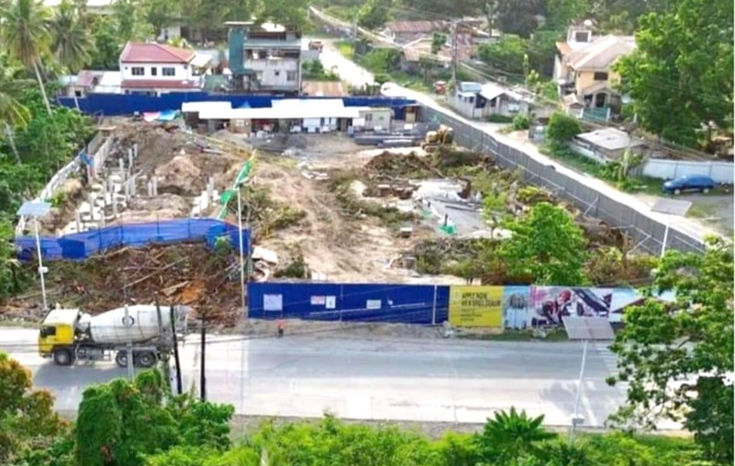NOTE: THIS STORY WAS FIRST PUBLISHED IN THE BOHOL CHRONICLE’S SUNDAY PRINT EDITION.
A crusading lawyer has filed charges for graft and grave misconduct against the head of the Community Environment and Natural Resources Office (CENRO) of Tagbilaran City whom he holds liable for the “illegal cutting” of hundred-year old acacia trees in the city.
Atty. Jordan Pizarras told the Chronicle that he filed before the Office of the Ombudsman for Visayas a criminal complaint for violation of Section 3(e) of Republic Act No. 3019, or the Anti-Graft and Corrupt Practices Act, with an administrative charge for grave misconduct against Elena G. Suarez, in her official capacity as the officer-in-charge of CENRO-Tagbilaran.
According to Pizarras, the filing of the complaint coincidentally marks one year since the CENRO Tagbilaran issued four Private Tree Plantation Registration (PTPR) which paved the way for the cutting of the 4 “heritage” acacia trees located along the corner of CPG North Avenue and Baguio Drive in Barangay Taloto, Tagbilaran City.
To recall, CENRO Tagbilaran issued PTPR 02-2023-0027 on February 28, 2023 which Pilipinas Shell Petroleum Corporation used as a “permit” to cut the acacia trees in order to give way to Shell’s construction of a gas station.
“The issuance of the PTPR by CENRO Tagbilaran was the death sentence of the four acacia trees, in total disregard of the trees’ ecological and historical importance,” Pizarras said.
Pizarras said it is common knowledge among Tagbilaranons and Boholanos that hundreds of acacia trees were planted along the roads and highways all over Bohol by previous generations of Boholanos at the turn of the century or in the 1900’s upon the initiative of the American colonial government through the Bureau of Public Works.
“The trees were planted because of their extensive and powerful root system that protected the highways from being washed out by flood waters during the rainy season. They provide shade at the time when there were no vehicles or other modes of transportation.”
The four huge acacia trees that were cut down by Shell gave the area a Baguio City-like feel which was the reason why the adjacent road was popularly referred to as Baguio Drive and the area as “Little Baguio,” Pizarras explained.
In his complaint, Pizarras stated that the acacia trees were “a source of great comfort for the seminarians” who were studying at the nearby Immaculate Heart of Mary Seminary, and Tagbilaranons in general.
“They provided shade from the heat of the sun during summer and shelter from the rains during wet season. Those trees form part of the fond memories of the days of many Boholano youth. Easily they are more than a hundred years old. They are heritage trees.”
Pizarras, a Manila-based Boholano lawyer, explained that the PTPR gave a semblance of legality to the cutting down of those trees as Pilipinas Shell put up posters at the Tree-Cutting Site invoking the PTPR issued by CENRO Tagbilaran as a permit to cut.
“The PTPR is not the permit that is required to be issued prior to the cutting, removal or relocation of naturally growing trees. The PTPR is applicable only to trees that an individual has planted himself. In no way can Pilipinas Shell prove that it planted the over a hundred year old trees itself,” Pizarras clarified.
Pizarras said CENRO Tagbilaran officer-in-charge Suarez should be held responsible for the illegal cutting down of the trees.
“Suarez is responsible for the unwarranted issuance of PTPR No. 02-2023-0027 at the instance of Pilipinas Shell. This paved the way for the illegal cutting down of the four heritage acacia trees.”
Pizarras added that CENRO’s issuance of PTPR No. 02-2023-0027 is highly irregular and illegal since a PTPR applies only to trees in a plantation that an individual has planted and harvests later.
“There is a fraud and a corrupt practice here because the PTPR clearly does not apply to hundred-year-old heritage trees. Neither does it apply to cutting of trees located along public roads – such as in this case wherein the trees are located along the national road. For this, an applicant needs a special permit from the Department of Public Works and Highways and the local government unit,” Pizarras said.
Suarez, and some unidentified CENRO Tagbilaran employees who allegedly connived with Pilipinas Shell, actively participated in the issuance of the illegal PTPR which allowed Pilipinas Shell to cut down the acacia trees.
“This is in violation of Section 3(e) of the Anti-Graft and Corrupt Practices Act for which Suarez and her cohorts must be penalized,” Pizarras stated in his complaint.

